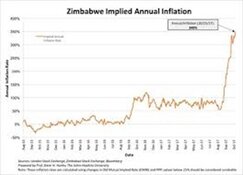When surveying the investment landscape, it appears to offer endless possibilities.
Thousands of corporations. Numerous industries. Countless market movements to capitalize on.
Yet here's the stark reality: The majority of stocks will diminish your capital.
That's not hyperbole. It's basic math.
Were you aware that a groundbreaking analysis from Arizona State University discovered that throughout the last hundred years, a mere 4% of equities have generated the entire positive performance of the American stock market?
The remaining 96% were either stagnant, declining, or experienced such volatility that they ultimately surrendered all their gains.
Consider that fact. For every Nvidia Corp. (NVDA:NASDAQ) or Apple Inc. (AAPL:NASDAQ), thousands of others never achieved meaningful growth.
Financial giant JPMorgan Chase & Co (JPM:NYSE) confirmed this phenomenon. Nearly half of all equities experience "catastrophic losses," defined as a decline of 70% or greater without recovery.
The investment landscape resembles a danger zone more than an opportunity field.
According to Stephen, this isn't merely coincidental:
"We see this phenomenon outside of investing, too.
In the NBA, just two teams — the Celtics and the Lakers — have won nearly half the championships.
A few writers dominate the bestseller lists, while most others barely sell a few hundred copies.
One search engine — Google — owns nearly 90% of the global search market.
We call this effect the Power Law."
Here's why understanding this matters tremendously:
Most financial advisors disregard the Power Law to their clients' detriment.
In a Power Law environment, the appropriate individual equity can deliver more portfolio value than numerous "conservative" investments ever could.
Yet conventional strategies typically revolve around diversification and valuation metrics as the sole path to performance. Select a few technology companies. Add some cyclical industries. Avoid stocks trading at 60X earnings.
This methodology assumes equal potential across all equities. But reality functions differently.
The Magnificent 7 — Apple, Nvidia, Amazon.com Inc. (AMZN:NASDAQ), Alphabet Inc. Class A (GOOGL:NASDAQ), Meta Platforms Inc. (META:NASDAQ), Tesla Inc. (TSLA:NASDAQ), and Microsoft Corp. (MSFT:NASDAQ) — have ranked among the market's premier performers over the past 15 years.
$1,000 allocated to each ($7,000 total) at 2010's beginning would be worth approximately $900,000 today . . . all from seven "straightforward" equity selections.
Identifying Power Law companies isn't simple. Most individuals should purchase index funds and focus elsewhere. But for greater, quicker returns, leveraging the Power Law remains the only effective approach.
Which leads to the essential question:
How do you identify the select few companies that generate all the returns?
After extensive analysis of market winners, we've identified three common characteristics nearly all exhibit before achieving dominance.
At RiskHedge, we term these the Three Powers:
The Power of Possibility. The Power of Adoption. And the Power of Misunderstanding.
Let's examine each component.
The Power of Possibility
Extraordinary companies frequently emerge at the frontier of innovation.
A novel platform . . . breakthrough technology . . . or infrastructure transformation.
Consider Walmart Inc. (WMT:NYSE). They constructed an entirely new retail framework dependent on one critical development: widespread automobile ownership.
Before cars became common, consumers required shops in urban centers accessible on foot. Since downtown real estate was limited and costly, these establishments tended to be compact.
Widespread car ownership unveiled entirely new opportunities. It enabled Walmart to establish enormous locations on affordable peripheral properties. This transformed Walmart into one of history's greatest equity performers. A $1,000 investment in WMT during 1972 would approximate $5.7 million today.
Tesla's ascent followed comparable patterns.
Electric vehicles (EVs) existed for over a century. But only following advancements in lithium-battery technology did EVs become practical. Tesla capitalized on this moment and expanded faster than anticipated. Its equity value surged, consequently, making Elon Musk among the world's wealthiest individuals.
Or examine Apple. The original iPhone represented design excellence. A refined touchscreen device offering internet access anywhere. But it operated on sluggish 2G and 3G networks. The arrival of 4G in 2010 unlocked tremendous possibilities for iPhone users.
Distributing images and videos via social platforms, real-time directions, streaming content, video conversations, and similar activities became effortless. The iPhone evolved into the command center for contemporary living. Apple expanded into the globe's largest corporation as a result, creating substantial investor wealth along the way.
The insight: An equity benefiting from emerging possibilities represents a potential significant winner.
The Power of Adoption
Innovative technology alone proves insufficient. It must alter behavior.
Improved WiFi capabilities created opportunities for Netflix Inc. (NFLX:NASDAQ) to deliver high-definition content. But its enduring success materialized when consumers transformed their entertainment consumption habits.
They developed new routines. No more traveling to retail locations for DVDs. No additional late penalties. Just immediate access to content, anytime. Weekend visits to Blockbuster evolved into marathon sessions of House of Cards from home.
Uber Technologies Inc. (UBER:NYSE) didn't merely enhance taxi efficiency. It reconfigured transportation perspectives. The concept of entering unknown vehicles transformed from unthinkable to commonplace within just years. Similarly, requesting transportation through smartphone applications replaced traditional street-hailing methods.
Spotify Technology SA (SPOT:NTSE) accomplished similar changes for music. The concept of accessing tracks from remote servers was technically feasible before Spotify, but uncommon.
Spotify revolutionized the experience. Immediate access to virtually every recording globally, available anywhere, without ownership requirements. This shift rendered piracy and downloaded files obsolete.
It completely transformed music consumption patterns. Curated collections replaced albums. Algorithms superseded radio. And Spotify became the standard method millions utilize for daily listening.
Exceptional companies inspire new behavioral patterns. It explains why their equities can appreciate for extended periods.
The Power of Misunderstanding
Markets aren't consistently rational. They frequently misinterpret situations, particularly during early stages.
Stephen elaborates:
"When a new idea is widely understood and fully appreciated, its price usually reflects that. But when an innovation is misunderstood, dismissed, mocked, or ignored, it creates a gap between price and reality.
That gap is where outsized returns live."
Initially, Amazon was mischaracterized as an unprofitable online bookstore.
Bitcoin (BTC) was rejected as fraudulent and unsustainable.
Nvidia was perceived merely as a gaming component manufacturer.
All three generated substantial wealth for numerous investors.
Even the internet itself was once characterized by a Nobel economist as temporary, with no greater impact than facsimile machines.
These misconceptions aren't limited to average observers. They're typically maintained by industry veterans and institutional thinkers.
And therein lies the opportunity.
Next time you consider a stock purchase, ask yourself:
Does this enterprise exist at the convergence of possibility, adoption, and misunderstanding?
If affirmative, the Power Law will operate advantageously.
In The Jolt, Stephen McBride shows his readers the little-known companies applying the Power Law to today’s most disruptive megatrends. Whether it’s artificial intelligence, nuclear energy, electric vehicles, or drones… there’s disruptive tech everywhere.
If you want to learn about the leaders driving these megatrends forward, there’s no better place to start than The Jolt. Sign up here today.
| If you enjoyed this, make sure to sign up for the Jolt, Stephen McBride's twice-weekly investing letter-where innovation meets investing. | Go here to join |
Important Disclosures:
- As of the date of this article, officers and/or employees of Streetwise Reports LLC (including members of their household) own securities of Tesla Inc. and Apple Inc.
- Chris Reilly: I, or members of my immediate household or family, own securities of: Microsoft and Bitcoin. My company has a financial relationship with: None. My company has purchased stocks mentioned in this article for my management clients: None. I determined which companies would be included in this article based on my research and understanding of the sector.
- Statements and opinions expressed are the opinions of the author and not of Streetwise Reports, Street Smart, or their officers. The author is wholly responsible for the accuracy of the statements. Streetwise Reports was not paid by the author to publish or syndicate this article. Streetwise Reports requires contributing authors to disclose any shareholdings in, or economic relationships with, companies that they write about. Any disclosures from the author can be found below. Streetwise Reports relies upon the authors to accurately provide this information and Streetwise Reports has no means of verifying its accuracy.
- This article does not constitute investment advice and is not a solicitation for any investment. Streetwise Reports does not render general or specific investment advice and the information on Streetwise Reports should not be considered a recommendation to buy or sell any security. Each reader is encouraged to consult with his or her personal financial adviser and perform their own comprehensive investment research. By opening this page, each reader accepts and agrees to Streetwise Reports' terms of use and full legal disclaimer. Streetwise Reports does not endorse or recommend the business, products, services or securities of any company.
For additional disclosures, please click here.











































